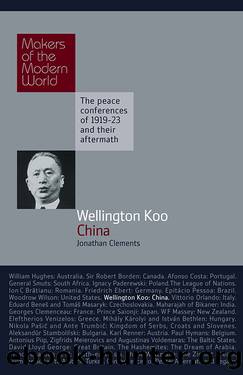Wellington Koo: China by Jonathan Clements

Author:Jonathan Clements [Clements, Jonathan]
Language: eng
Format: epub
Tags: China, Military, Wellington Koo, World War I, Biography & Autobiography, General, history, Presidents & Heads of State, Asia
ISBN: 9781907822360
Google: R1crDwAAQBAJ
Publisher: Haus Publishing
Published: 2008-10-01T23:23:54.092971+00:00
7
Marriage in Haste
Koo might have taken some solace from the news that his feelings on Shandong were shared by many Americans, were it not for the damage that this news was doing to the Treaty of Versailles as a whole. Senators in Washington queued up to denounce the Shandong deal, using forceful rhetoric that spoke of the rape of China, the immorality of the settlement, and repeatedly spoke of theft and robbery. Senator William Borah, an opponent of the League of Nations who gained the nickname of âthe Lion of Idahoâ, delivered the most stinging of rebukes to Wilson, calling the deal: âSo immoral and unrighteous that we wish to approach it with deaf ears and closed eyes ⦠It will dishonour and degrade any people who seek to uphold it. War will inevitably follow as the result of an attempt to perpetrate it ⦠Naked, hideous and revolting, it looms up before us as a monster from the cruel and shameless world which all had hoped and prayed was forever behind us.â1
The protestations from the Senate were the first signs of resistance in Washington to both Shandong and the Treaty of Versailles in general. It would end, many months later, with an ailing Wilson unable to ratify the Treaty in his own country, and see the League of Nations doomed to proceed without American participation.
If the Chinese nation desires to ⦠escape the destiny prescribed for it at Versailles ⦠it should understand that its only allies and brothers in the struggle for liberty are the Russian worker and peasant and the Red Army of Russia.
LEV KARAKHAN
Meanwhile, with pro-American feeling in China at an all-time low and pro-Japanese sympathisers hounded out of government, the immediate winner was Soviet Russia, which answered the American betrayal with a propaganda triumph. Lev Karakhan, the USSRâs Deputy Peopleâs Commissar for Foreign Affairs, issued a declaration to China on 25 July 1919. In it, the Soviet Union delivered a promise that had eluded the Great Powers, unilaterally renouncing the unequal treaties in China. The declaration came charged with political insinuations: âIf the Chinese nation desires to become free like the Russian people, and to escape the destiny prescribed for it at Versailles in order to transform it into a second Korea or a second India, it should understand that its only allies and brothers in the struggle for liberty are the Russian worker and peasant and the Red Army of Russia.â2
The Karakhan Manifesto, coupled with continuing Japanese aggression in northern China and the popular fervour of the 4 May demonstrations, created a fertile ground for a movement that was neither imperialist, pro-Western, nor pro-Japanese. The USSR was quick to act, setting up the Comintern organisation to foster Soviet ideology in foreign countries. Within a year, China had gained a Socialist Youth League, and a Communist faction was growing within Sun Yatsenâs southern government. It encouraged many of the disaffected people of China to switch their allegiance to the only nation that was seen to be sweeping away the traditions of old and looking to the future.
Download
This site does not store any files on its server. We only index and link to content provided by other sites. Please contact the content providers to delete copyright contents if any and email us, we'll remove relevant links or contents immediately.
Machine Learning at Scale with H2O by Gregory Keys | David Whiting(4284)
Never by Ken Follett(3922)
Harry Potter and the Goblet Of Fire by J.K. Rowling(3835)
Unfinished: A Memoir by Priyanka Chopra Jonas(3363)
Fairy Tale by Stephen King(3358)
The Man Who Died Twice by Richard Osman(3055)
Will by Will Smith(2891)
Rationality by Steven Pinker(2344)
It Starts With Us (It Ends with Us #2) by Colleen Hoover(2319)
Can't Hurt Me: Master Your Mind and Defy the Odds - Clean Edition by David Goggins(2312)
The Dark Hours by Michael Connelly(2290)
The Storyteller by Dave Grohl(2212)
Friends, Lovers, and the Big Terrible Thing by Matthew Perry(2208)
The Dawn of Everything: A New History of Humanity by David Graeber & David Wengrow(2184)
The Becoming by Nora Roberts(2179)
The Stranger in the Lifeboat by Mitch Albom(2104)
Cloud Cuckoo Land by Anthony Doerr(2082)
Love on the Brain by Ali Hazelwood(2046)
Einstein: His Life and Universe by Walter Isaacson(1997)
